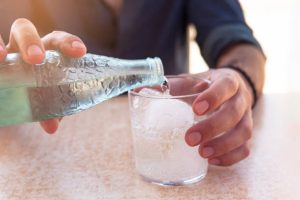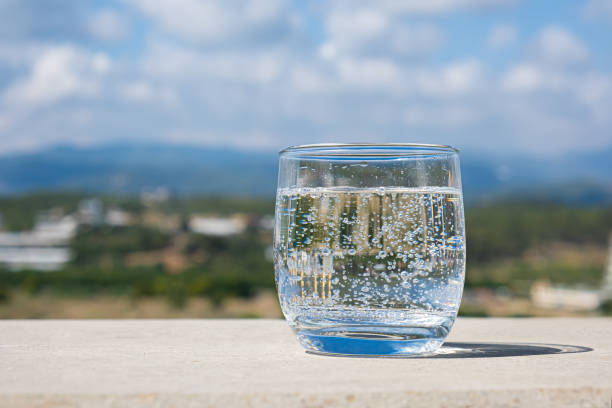Table of Contents
ToggleSparkling water has surged in popularity as a beverage option, particularly among those seeking to reduce their sugar intake. While plain water has long been regarded as the healthiest beverage choice, carbonated water has emerged as a tasty and refreshing alternative. However, the rise of sipping sparkling water has also led to growing concerns about its impact on dental health. Some individuals worry that the carbonation and acidity of sparkling water may cause enamel erosion, which could ultimately result in cavities.
Despite these potential risks, there are steps that people can take to mitigate the impact of sparkling water on their teeth. For instance, drinking sparkling water through a straw can help reduce direct contact with teeth, while also ensuring that the beverage is distributed evenly throughout the mouth. It’s also important to maintain a consistent oral hygiene routine, which includes regular brushing, flossing, and dental check-ups.
In this blog post, we will delve into the evidence and assess whether or not sparkling water can pose a risk to your dental health.
What is sparkling water?

Sparkling water is water that has been carbonated, which means carbon dioxide gas has been dissolved into it. It differs from still water, which has no carbonation, and other carbonated beverages, which can contain other ingredients such as sweeteners or flavorings.
Carbonation is the process of adding carbon dioxide to water, creating bubbles and fizz. The gas dissolves into the water, creating carbonic acid, which gives the water its slightly tangy taste.
There are two main methods of carbonating water: natural and artificial. Natural carbonation occurs when water naturally absorbs carbon from the ground or from underground springs.
The amount of carbonation can vary depending on personal preference, but typically, sparkling water has a higher level of carbonation than other carbonated beverages.
Unsweetened sparkling water is often marketed as a healthier alternative to sugary drinks, and it can be a refreshing and hydrating beverage choice. It can also be used in cocktails and other mixed drinks, adding a bubbly texture and a slightly acidic taste. However, some people may find that the carbonation in sparkling water can cause bloating or discomfort, and it is not recommended for those with certain health conditions.
How does sparkling water affect tooth enamel?

Sparkling water has gained popularity as a healthier alternative to sodas. However, its effect on teeth has raised concerns among dental professionals. The main issue with sparkling water and teeth is its acidity.
The ph level of sparkling water
The pH scale measures the acidity or alkalinity level of a substance, with a range from 0 to 14. A pH of 7 is neutral, and anything below that is acidic, while anything above is alkaline.
The acidity level of a drink is crucial as it affects the enamel of the teeth. Most sparkling water has an acidic pH of around 3-4, which is more acidic than still water or even soda. Drinking too many acidic beverages can lead to enamel erosion, sensitivity, and cavities.
Tooth enamel is the hard, protective outer layer of the teeth that keeps them from decaying. When the enamel erodes, it can lead to tooth sensitivity and increase the risk of cavities. Dental professionals recommend limiting the consumption of acidic drinks to protect teeth. Rinsing the mouth with water after drinking acidic beverages can also help reduce their harmful effects. Additionally, brushing teeth at least twice a day with fluoride toothpaste and visiting the dentist regularly can help maintain oral health.
Consequences of consuming acidic drinks
Consuming acidic drinks regularly can have significant consequences on your health. These drinks, such as soda and energy drinks, can erode your teeth over time, leading to tooth decay and sensitivity.
They can also irritate your digestive system, causing acid reflux and heartburn. Moreover, excessive consumption of acidic drinks can lead to dehydration, as these drinks tend to be high in sugar and caffeine, both of which are diuretics. In the long run, drinking acidic beverages can increase your risk of developing health problems such as obesity, type 2 diabetes, and kidney disease.
Therefore, it’s important to limit your intake of these drinks and opt for healthier alternatives like water or herbal tea.
Tips for reducing the risk of tooth damage from sparkling water
To reduce the risk of tooth damage from sparkling water, there are a few tips to follow.
Firstly, consider drinking it with a straw to minimize the contact between the water and your teeth.
Secondly, don’t swish it around in your mouth as this can erode the enamel on your teeth.
Additionally, try to consume sparkling water in moderation and balance it out with still water.
Lastly, be sure to maintain a regular dental hygiene routine that includes brushing and flossing twice a day and visiting your dentist regularly.
By following these tips, you can enjoy sparkling water without putting your dental health at risk.
Can sparkling water be consumed safely?

Sparkling water has become increasingly popular as an alternative to sugary beverages. However, some people may be concerned about its safety and potential effects on dental health. Compared to other common beverages such as soda, sparkling water generally has a lower acidity level.
Carbonic acid
To reduce the risk of tooth damage, it is recommended to drink sparkling water through a straw, avoid swishing it around the mouth, and not drink it too frequently or in large amounts. Some brands of sparkling water are also less acidic than others, with a higher pH. For example, Perrier and San Pellegrino have a pH of 5.5, while Topo Chico has a pH of 4.5. Flavored sparkling waters may contain citric acid, which can increase acidity levels.
It’s important to read labels and choose brands with lower levels of carbonation and acidity. In moderation, plain carbonated water can be safely consumed as part of a healthy diet. It can be a refreshing and hydrating option, but it’s essential to be mindful of its potential effects on dental health. By taking some simple precautions and choosing the right brand, you can still enjoy the benefits of sparkling water without putting your teeth at risk.
What do dentists say about sparkling water?
Dental professionals have mixed opinions on the impact of sparkling water on teeth. Some believe that the carbonation and acidity of sparkling water can cause erosion and decay of teeth.
Additionally, a 2016 study suggested that the carbon in sparkling water could cause the demineralization of teeth. On the other hand, some dental professionals argue that sparkling water is a better alternative to sugary drinks, which are known to cause tooth decay. In fact, a 2019 study found that sparkling water did not have a significant effect on the erosion of tooth enamel compared to other carbonated beverages.
Furthermore, the American Dental Association states that sparkling water is generally safe for teeth as long as it does not contain added sugars or acids. To maintain good dental health, dental professionals recommend drinking sparkling water in moderation and using a straw to reduce contact with teeth.
Regular dental check-ups and good oral hygiene practices, such as brushing and flossing, keep teeth healthy regardless of beverage consumption.










